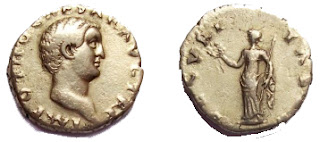 |
| Otho 15 January - 17 April AD 69 |
Though Otho reigned for only three months,
the near-contemporary accounts by Suetonius and Tacitus provide us with a
poignant portrait of a complex man. His image on busts and coins confirms
Suetonius's description:
"Otho, who did not look like a very
courageous man, was of medium height, bow-legged, and with splay feet; but
almost as fastidious about appearances as a woman. His entire body had been
depilated, and a well-made toupee covered his practically bald head."
A member of the patrician Julio-Claudian
clan, Otho had been a wild youth, wandering the streets of Rome in search of
drunks to toss in a blanket. He wrested the celebrated beauty Poppaea from her
husband and married her. Then, Tacitus alleges, he won influence at court by
deliberately talking up his wife's charms to the emperor Nero. (Suetonius
suggests that Otho was already himself in a physical relationship with Nero.)
Tacitus gives a brilliant description of Poppaea's wiles, pretending to be
overwhelmed by Nero's good looks and then claiming devotion to Otho, a man 'for
whom nothing is too good'. For a while the two men shared Poppaea's favours,
until Nero pulled rank and made Otho Governor of Lusitania. Otho's ten year
administration of the province was, according to Suetonius, marked by
'considerable restraint'. When Nero's excesses led to a revolt, Otho threw in
his lot with the then 72-year old Galba, who succeeded to the empire after Nero
killed himself in June 68 AD.
Seven months later Otho himself revolted
when Galba adopted Piso Frugi Lucianus as his heir. His motive may have been
personal ambition (inflamed, if you believe Suetonius, by an astrologer's prediction).
But, Suetonius relates that Galba had offended Romans by sentencing many to
death 'without trial on the scantiest of evidence', and had outraged the army
by refusing to pay a promised bonus. Some, it seems, hoped that Otho would
restore the old republican virtues. There were few to defend Galba when the
plot emerged.
But Otho was not recognised by the army in
Germany which, instead took an oath of allegiance to their general, Vitellius.
Otho wrote to Vitellius, offering to marry his daughter and share imperial
power with his father-in-law. But by this time Vitellius's men were too eager
for the bounty that would come if their general became emperor, and Vitellius's
hands were tied. According to Suetonius, once Otho's diplomatic moves had
failed to achieve peace, he 'set out gaily on his campaign'.
Suetonius's father served in Otho's army
and gave his son a favourable account of the emperor's end. After the defeat of
his troops at Bedriacum, he still commanded the loyalty of many of his men and
could have fought on. But 'his conscience prevented him from continuing to
hazard lives and treasure in a bid for sovereignty'. On his last night he wrote
letters to his sister and to Nero's widow, Messalina, whom he had intended to
marry. He then burnt his correspondence to prevent reprisals against his
friends, placed a dagger under his pillow, slept soundly, and when he awoke at
dawn immediately stabbed himself in the left side.
When coin collecting came into vogue in the
seventeenth century, one favourite series consisted of the emperors covered by
Suetonius's history: Julius Caesar, Augustus, Tiberius, Gaius (Caligula),
Claudius, Nero, Galba, Otho, Vitellius, Vespasian, Titus, Domitian. The wealthy
'virtuoso', would return from his Grand Tour of France and Italy with a set of
the 'Twelve Caesars' in silver, gold or, best of all, large, orichalcum
sestertii with matching patina. Unfortunately, however, no sestertii were
struck during Otho's three month reign, so large numbers of 'Paduan' forgeries
were struck to satisfy the demand, many of them of excellent style and fabric.
One sign of the growing popularity of
coin-collecting was Joseph Addison's 1720 Dialogues on Medals ('medal' was the
word used to dignify all ancient classical coinage). The great poet, Alexander
Pope, wrote one of his most brilliant works as a preface to this volume. He
depicts a personified Ambition despairing of preserving the glories of ancient
civilisation through great temples, columns and public monuments. These have
all crumbled to dust; sometimes even their place on the map is lost. But,
Ambition finds to her delight (and to Pope's who was only 4 foot six inches
high), that the glories of the past do survive, but only in the miniature form
of disregarded coins, whose images may be as sharp and vivid as when they were
first made:
"Ambition sigh’d: she found it vain to trust
The faithless column and the crumbling
bust;
Huge moles, whose shadow stretch’d from
shore to shore,
Their ruins perish’d, and their place no
more!
Convinced, she now contracts her vast
design,
And all her triumphs shrink into a coin.
A narrow orb each crowded conquest keeps,
Beneath her palm here sad Judea weeps:
Now scantier limits the proud arch confine,
And scarce are seen the prostrate Nile or
Rhine:
A small Euphrates thro’ the piece is
roll’d,
And little eagles wave their wings in gold."
Pope goes on to satirise 'pale antiquaries'
who 'pore' over the inscription of a coin, but 'adore' the 'rust' or 'varnish'
(patina).
"This the blue varnish, that the green
endears,
The sacred rust of twice ten hundred years!"
And he describes the ardent collector
dreaming of obtaining a 'Pescennius [Niger]', still a rarity today. Denarii of
Otho are not so rare nowadays. But in the eighteenth century not enough hoards
had been discovered to satisfy the market, and Otho was by far the rarest of
the 'Twelve Caesars':
"And Curio, restless by the fair one's side,
Sighs for an Otho, and neglects his bride."
Even in the eighteenth century there were
those for whom numismatics was better than sex.
No comments:
Post a Comment